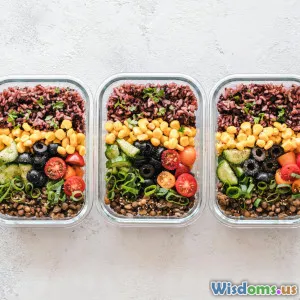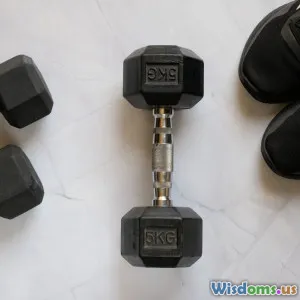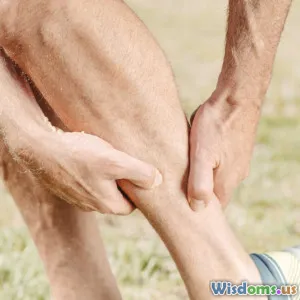
Hydration Myths Uncovered
6 min read Explore common myths surrounding hydration and discover the truths that can enhance your health and fitness. (0 Reviews)
Hydration Myths Uncovered
Hydration is a fundamental aspect of health and fitness, yet it is often clouded by misconceptions and myths. Understanding hydration is essential for maintaining optimal bodily functions and enhancing athletic performance. This article aims to unveil some common hydration myths and provide clarity on what effective hydration truly means.
Myth 1: You Need to Drink Eight Glasses of Water a Day
The ubiquitous advice to drink eight 8-ounce glasses of water daily, known as the '8x8 rule', is a guideline that lacks scientific backing. While hydration needs vary significantly based on individual factors like age, sex, weight, activity level, and climate, there’s no one-size-fits-all approach.
The Truth:
The National Academies of Sciences, Engineering, and Medicine suggests a daily water intake of about 3.7 liters (or 13 cups) for men and 2.7 liters (or 9 cups) for women, taking into account all beverages and food consumed. Listening to your body’s thirst signals is a more practical approach, as they can guide you towards adequate hydration.
Myth 2: Thirst is a Sign of Dehydration
Many believe that feeling thirsty means they are already dehydrated. However, thirst is merely a signal from your body that it requires fluid intake.
The Truth:
While thirst is a helpful indicator, it is essential to drink water before reaching that point, especially during workouts or hot weather. Regularly consuming fluids throughout the day can prevent dehydration more effectively than waiting for thirst to strike.
Myth 3: You Can Hydrate with Any Beverage
It’s a common belief that all liquids contribute equally to hydration. Many people assume that coffee, tea, and sugary drinks can replace water.
The Truth:
While most beverages do contribute to hydration, water is the most effective choice. Drinks high in caffeine can act as diuretics in large amounts, which may lead to increased urination and potential dehydration. Similarly, sugary drinks can lead to increased thirst and don’t provide the same hydration benefits as water. Opt for water, herbal teas, or drinks with low sugar content for effective hydration.
Myth 4: You Can't Overhydrate
While dehydration is a serious concern, some believe that overhydration is a myth. However, drinking excessive amounts of water in a short period can lead to a condition known as hyponatremia, where the sodium levels in your blood become dangerously low.
The Truth:
Overhydration is indeed possible, albeit rare. It's essential to balance water intake with electrolyte consumption, especially during prolonged physical activities where sweat loss occurs.
Myth 5: Hydration is Only Important During Exercise
Some individuals think that hydration is only necessary during workouts or physical activities.
The Truth:
Hydration is crucial at all times, not just during exercise. Your body loses water through various means, including breathing and digestion, even when you're at rest. Maintaining consistent hydration supports overall health and bodily functions, from regulating temperature to aiding digestion.
Myth 6: Eating Fruits and Vegetables Doesn’t Count Towards Hydration
Many people do not consider the fluids obtained from food as part of their daily hydration.
The Truth:
Fruits and vegetables contain significant water content and can contribute to your overall hydration. Foods like cucumbers, oranges, and watermelon are excellent choices that not only hydrate but also provide essential nutrients. Incorporating these foods into your diet can enhance your hydration levels effectively.
Conclusion
In conclusion, understanding the myths and facts about hydration can significantly influence your health and fitness journey. By debunking common misconceptions, you can make informed choices about your hydration habits. Remember to listen to your body, incorporate hydrating foods, and choose water as your primary source of hydration. By doing so, you’ll pave the way for improved performance and overall well-being. Stay hydrated, stay healthy!
Rate the Post
User Reviews
Popular Posts





















